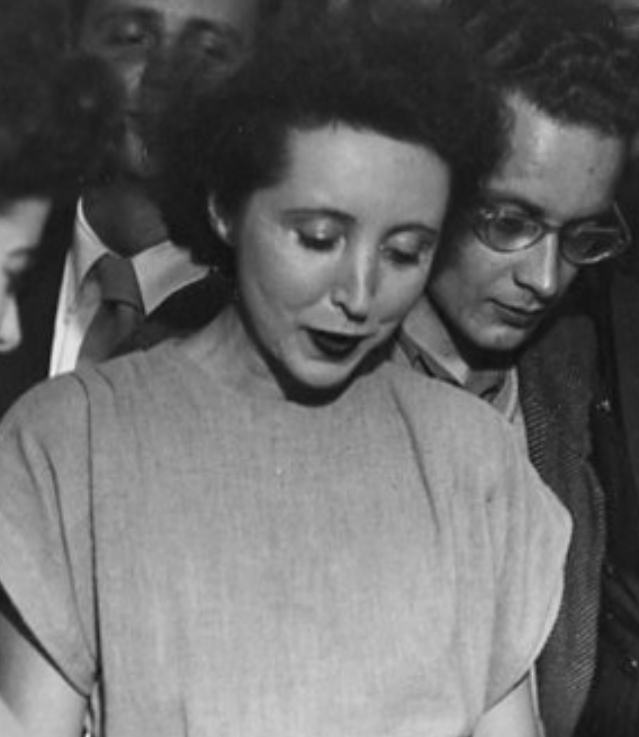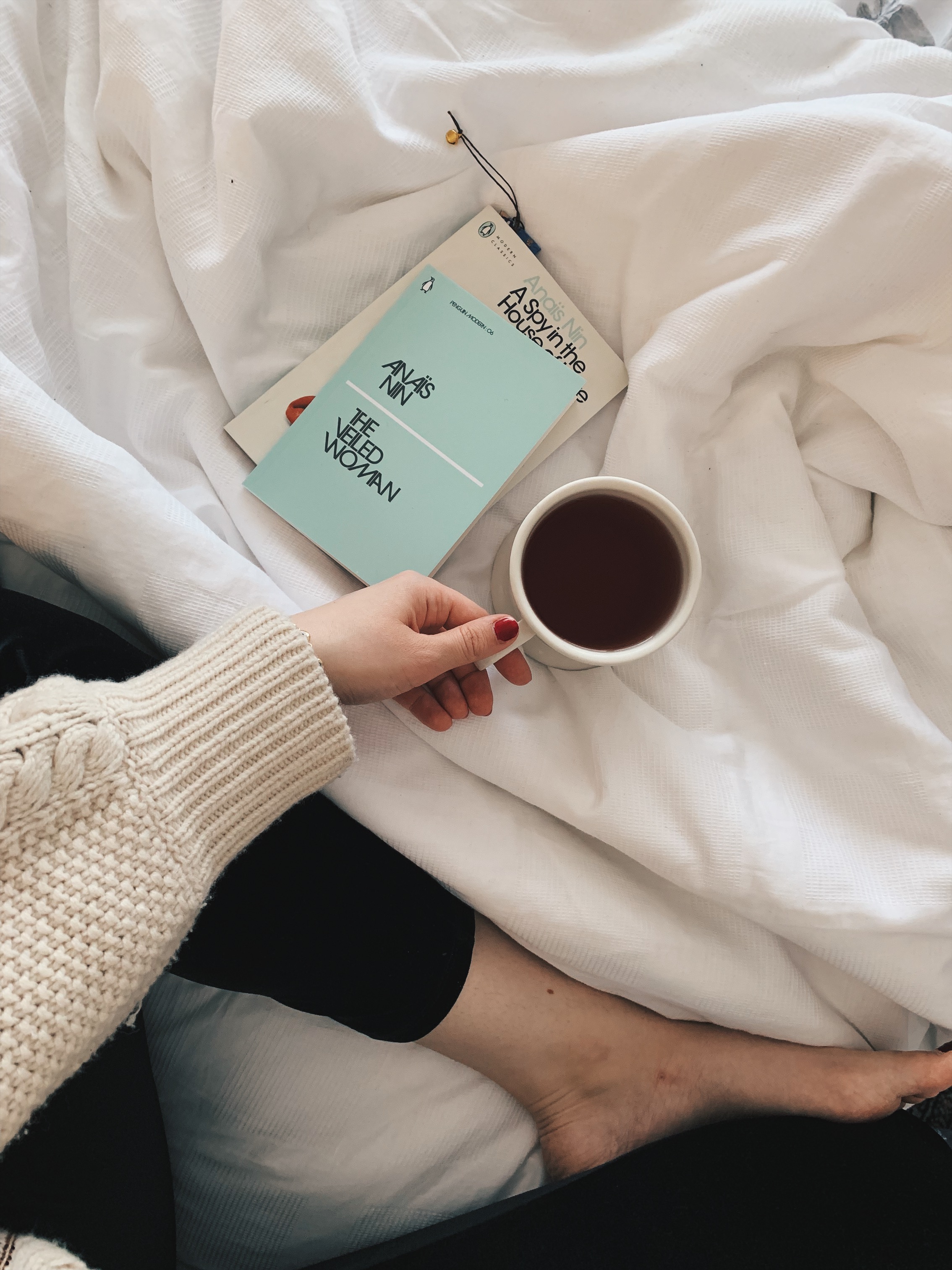Life Lessons from Odd Places: Anaïs Nin & Chronic Pain
So, I recently went down the rabbit hole that is Anaïs Nin’s journals. Publication-wise, she is mostly known for erotica, but she also lived an endlessly fascinating life. Born in France to parents of Cuban-American but also Spanish, French, and Danish descent, Nin was raised in Paris and New York, married in Cuba, moved back to Paris, and then settled in California, where she eventually passed away after a long, vivid life lived amidst a backdrop of musicians and writers and bankers and dancers of all nationalities. She wasn’t only surrounded by people who lived, but she herself lived. And most of all, she lived for herself.
“Everyday I am more interested in life and character, in living directly, vividly. In consequence, I read less poetry, which is about life and not life itself.”
In an entry from Nin’s diaries (The Early Diary of Anaïs Nin: Volume 4), dated September 24, 1927: “Everyday I am more interested in life and character, in living directly, vividly. In consequence, I read less poetry, which is about life and not life itself.”
Life was the most important thing to her, but in the very next entry, dated September 27, she wrote: “Just as I had written that line about poetry I was saved by the greatest poet alive today – Armand Godoy. [...] [His] poetry has resounded in that inaccessible world of spiritual shadows where the sound of it can never be lost.”
This brings to mind an incredibly important idea I’ve learned in the past few years: the philosophical concept of holding multiple conflicting ideas in your head at the same time. Both statements of hers were true at once – life can be life and poetry can be life. To look at it like a quantum physicist, the cat is simultaneously dead and alive.
Anaïs Nin, Wikimedia Commons.
For a practical example of this idea, as we take Nin’s love of life as inspiration, we have to understand how privileged she was. She was married for much of her adult life and may thus be seen to have conformed to society’s expectations, but she was also open about her affairs and the fluidity of her sexuality in her writing. Still, her marriage kept her moderately wealthy, freeing her from work in the factories, fields, or offices. She could even afford to hire a maid and leave manual domesticity to someone else. Yes, as a society wife, she ran her household, and yes, she was bound to that society as if by “a spider’s web,” as she describes it, caught up in social engagements as a banker’s wife, but these were the downsides to an economic lifestyle that permitted (and funded) her artistic existence.
I myself am from a middle-class background (in the American sense, which means, never impoverished, but not rich) but family income is not the only difference between Nin and myself. I have a health condition – comparatively mild fibromyalgia, which causes severe fatigue, as well as joint and muscle pain. The average good day feels, at best, like the last day of the flu. Other days feel like the second day of the flu, or the first, or somewhere in the middle. I’m practically always in pain, at least a bit, and I’m always up for a lie-down. That’s not to say I want to lie down all the time. I want to be up and awake – I’d never sleep again if I could avoid it. Sleeping is a necessary nuisance. I hate sleeping. I always did.
Before I “got sick,” I barely slept. Perfectionism would keep me awake into the wee hours of the morning, and anxiety would awaken me, shaking and nauseous, a few hours later. Then I got sick. Or had a nervous breakdown. Or something. The line between depression and fibromyalgia is twisted and loopy and blurry. Maybe I made myself sick. Sometimes it feels like I probably did, but I can’t change that. I can never live a life like Anaïis Nin. I can never live a life as continually vivid and passionate, at least not how we perceive a life that is vivid and passionate. Robbed of my “youthful energy”, I’ve had to learn to redefine my own life and “a life” more generally.
An introductory university composition class I’d put off until my fourth year at college was the class I’d least expected to change my life, and due to the straightforward, heavily structured nature of the class, that was a fair assumption. But the instructor, a PhD student in the English department, was particularly brilliant and had us read “Sick Woman Theory” by Johanna Hedva, which is an essay of the author’s attempt to understand their chronic illness within the world at large — America-centered, capitalist, ultra-patriarchal. Accompanying the text were photographs of Hedva in their beautiful bedroom with large windows and massive plants and many, many books stacked against the walls. Hedva presented me with the political side of what my existence as a sick woman meant, but they also showed me the creation of a world within four walls.
There’s another article that helped me understand what I was going through — a BBC News piece on a photographer named Michael van Huffel who once worked for Prince before developing Chronic Fatigue Syndrome (CFS/ME), a mysterious disease seemingly related to fibromyalgia. “I had it all—now I create a new world in a single room,” he says, taking astonishing photographs of flowers in his apartment. A new world in a single room.
Photo by Olivia Gündüz-Willemin.
Saturdays — slow, gentle Saturdays, have become my favorite days. Waking up late — around 10am, drinking strong black coffee and having oat bread with coconut butter while listening to vinyl records, and then making my rounds around my apartment, organizing my room, taking out the garbage, doing leftover dishes, cleaning the sinks—now while hand-me-down 90s alternative albums play on the stereo.
Saturdays used to be the first full day of a long, miserable, lonely weekend — two days in which I’d fling my deep-fried brain against the walls, trying to make it function, to no avail, completely and totally unaware I couldn’t calm it down through sheer force of will, that calming down is a long, unpredictable process. I used to think I had no time for “housework”, and did it as quickly as possible and put off what I could “until I actually had the time”, thinking of Simone de Beauvoir moving out of her parents’ house and into a room with a maid. In my life, I’ve never been, and likely never will be, wealthy enough to afford a maid, and even if I ever can, unless I grow very, very ill, I doubt I’ll hire one.
I know how incredibly privileged I am to have a (fairly) temperature-controlled home and nutritious food, and even non-necessary things like recorded music, coffee, and wine. Humans without ready access to even the necessities might still find joy in what they do have, or they might make it.
So, while lying very still in bed with my eyes closed, my whole body nearly shaking after a full day of classes or work, I meditate on my pain.
“...the more I understand that I exist, in the most literal sense of the word.”
Have you ever found joy in pain? No? Yes, you have. You know, when you’re listening to, say, Sufjan Stevens, and you start crying because he understands the world so fully, so humanely, and it hurts, but you love how it hurts because it makes you feel alive? That’s what finding joy in fibromyalgia pain is like for me. I’m lucky. I’m very lucky — my pain isn’t as bad as many others’, and so I can meditate on it and find peace. Physical pain becomes a reminder of my corporeal existence in space and time the way emotional pain might for somebody else. For instance, the longer I hold up my arm, the further above my head, the more it hurts — the more I understand that I exist, in the most literal sense of the word.
I mean, now that I’ve had the experience of having this pain, I’d happily toss it away and resume my life, but I can’t very well do that, now can I?
“So I find joy in what I have. ”
So I find joy in what I have. In the way it feels when I finally relax all my muscles and don’t have a care in the world, even if the only way my type-A mind can understand that is to decide my current one and only task is to not have a care in the world. Snuggled in a decades-old blanket made of feedsack cloth, beneath the metaphysical warmth of all the family members, living and dead, who’ve ever wrapped themselves in that very blanket; the beat of my heart against my ribcage, gentle and steady and very, very hot — a metronome designating my existence in the universe. Sleeping is a necessary nuisance, I once said, and so, even though I hated it, I now find joy in it, because there’s nothing else to do.
“And with this knowledge, safe in my heart, I can look to Anaïs Nin, and open a notebook. I want to go to grad school, work as a teacher of some things and a writer of other things, and explore the world. I just can’t do it all as “vividly” as I once wanted to. But I’ll do it all.”
And with this knowledge, safe in my heart, I can look to Anaïs Nin, and open a notebook. I want to go to grad school, work as a teacher of some things and a writer of other things, and explore the world. I just can’t do it all as “vividly” as I once wanted to. But I’ll do it all. If the only way I can live, if the only way I can get out of bed, is to assign an absurd, arbitrary, “higher” purpose to my life, then I will. Because I can, in fact, hold two ideas in my head at once. Pain is still and always will be a blessing and a curse. Anaïs Nin lived a wonderful life, and I can attempt to emulate her even as I come to understand what’s telling me to want to emulate her. I can live a slow, gentle existence as well as a fast and passionate one. I can acknowledge the absurdity of human life at the same time I work to succeed in, even if I have to sit down a bit more often than the average Jo.
Annie Jo Baker is a 22 year old undergraduate in Kentucky, studying biology and chemistry, but has a myriad of other passions, especially literature and activism.


